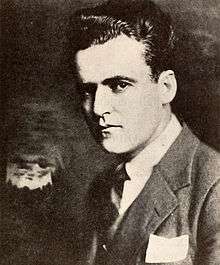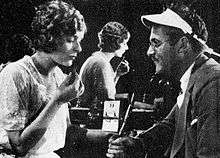Marshall Neilan
| Marshall Neilan | |
|---|---|
 Marshall Neilan, 1920 | |
| Born |
Marshall Ambrose Neilan April 11, 1891 San Bernardino, California, U.S. |
| Died |
October 27, 1958 (aged 67) Los Angeles, California, U.S. |
| Occupation | Actor, Screenwriter, Director, Producer |
| Years active | 1912-1957 |
| Spouse(s) |
Gertrude Bambrick (1913–1921) Blanche Sweet (1922–1929) |
| Children | 1 |
Marshall Ambrose "Mickey" Neilan (April 11, 1891 – October 27, 1958) was an American motion picture actor, screenwriter, film director, and producer.
Early life
Born in San Bernardino, California, Neilan was known by most as "Mickey." Following the death of his father, the eleven-year-old Mickey Neilan had to give up on school to work at whatever he could find in order to help support his mother. As a teenager, he began acting in bit parts in live theatre, and in 1910 he got a job as chauffeur, driving Biograph Studios executives around Los Angeles to determine the suitability of the West Coast as a place for a permanent studio.
Career
Neilan made his film debut as part of the acting cast on the American Film Manufacturing Company Western The Stranger at Coyote (1912). Hired by Kalem Studios for their Western film production facility in Santa Monica, Neilan was first cast opposite Ruth Roland. Described as confident, but egotistical at times, Neilan's talent saw him directing films within a year of joining Kalem. After acting in more than seventy silent film shorts for Kalem and directing more than thirty others, Neilan was hired by the Selig Polyscope Company then Bison Motion Pictures and Famous Players-Lasky Corporation. In 1915, Neilan was one of the founding members of the Motion Picture Directors Association along with directors such as Cecil B. DeMille, Allan Dwan, and William Desmond Taylor.
At the end of 1916, Neilan was hired by Mary Pickford Films where he directed Pickford in several productions including Rebecca of Sunnybrook Farm and The Little Princess in 1917, plus Stella Maris in 1918, Amarilly of Clothes-Line Alley, M'Liss in 1918, and Daddy-Long-Legs in 1919.
Having all but given up acting, Neilan's directing successes led to him creating his own production company and between 1920 and 1926, Marshall Neilan Productions made eleven feature-length films almost all of which were distributed through First National Pictures. He received critical acclaim for directing and producing such films as Bits of Life and The Lotus Eater. In 1929, he was hired by RKO Radio Pictures; although he reputedly had difficulty adapting to directing the new talkies, that year he successfully directed Rudy Vallee and Marie Dressler in the "all-talking" The Vagabond Lover. Contrary to the legend that the film was a commercial and critical failure (except for Dressler's highly praised performance), the film was a hit. making a profit of $335,000,[1] and was one of four top hits for RKO in 1929.[2]
Early in his career Neilan had done as most others in the pioneering days of film and helped out in many areas of filmmaking through performing, directing, and writing. A talented screenwriter, in 1927 he wrote the original story for the Howard Hughes film, Hell's Angels. Initially, he had also been hired as the film's director, back when it was still a silent, but Hughes' overbearing style forced him to drop out, and he was replaced a few weeks into production by a more pliable director, Edmund Goulding; due to massive reshoots (as well as the recasting of the lead role with Jean Harlow), none of the footage Neilan shot made it into the final film. He was then hired by Hal Roach Studios, for whom he directed a few films in 1930, and he made his final directorial effort in 1937. Having battled alcoholism for a large part of his adult life, twenty years after he made his last film, Neilan returned to acting on the screen in a small role portraying an aging and less than enlightened United States Senator in the Elia Kazan film, A Face in the Crowd.
In 1955, Neilan was awarded The George Eastman Award, given by George Eastman House for distinguished contribution to the art of film.
In recognition of his contribution to the motion picture industry, in 1940 the Directors Guild of America conferred on him an "Honorary Life Member Award." He later received a star on the Hollywood Walk of Fame at 6233 Hollywood Blvd.
Personal life

Marshall Neilan had married actress Gertrude Bambrick in 1913 with whom he would have a son, Marshall Neilan, Jr..
Neilan's marriage to Bambrick ended in 1921. A year later he married actress Blanche Sweet, whom he directed on several occasions. They divorced in 1929.
Death
Neilan died in Los Angeles in 1958 of throat cancer. He is interred in Angelus-Rosedale Cemetery.
Selected filmography
Actor
Director
|
Producer
Writer
|
References
External links
| Wikimedia Commons has media related to Marshall Neilan. |
- Works by or about Marshall Neilan at Internet Archive
- Marshall Neilan at the Internet Movie Database
- Marshall Neilan at Find a Grave
- Marshall Neilan at Virtual History